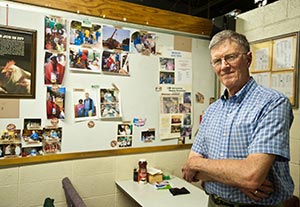For more than 50 years, Salvatorian Br. Regis Fust has run the Salvatorian Mission Warehouse in New Holstein. He began helping missionaries in 1963, when his sister, a nurse working in a U.S. hospital, asked where they could donate excess medical supplies. Br. Regis contacted a Salvatorian missionary, who arranged for shipment to a missionary hospital. For more than 50 years, Salvatorian Br. Regis Fust, 82, has run the Salvatorian Mission Warehouse in New Holstein. The community of Salvatorians and hundreds of volunteers celebrated his retirement on Feb. 7. (Catholic Herald photo by Sam Lucero)
For more than 50 years, Salvatorian Br. Regis Fust, 82, has run the Salvatorian Mission Warehouse in New Holstein. The community of Salvatorians and hundreds of volunteers celebrated his retirement on Feb. 7. (Catholic Herald photo by Sam Lucero)
Today, the 25,000-square-foot warehouse ships clothing, food and medical supplies to Catholic missionaries in 25 countries.
On Feb 7, the community of Salvatorians and hundreds of volunteers celebrated Br. Regis’ retirement with an 11 a.m. Mass at Holy Rosary Church, New Holstein.
Br. Regis, 82, will continue to serve at the warehouse for a time, according to the new director, Dave Holton. Holton, who has been the associate director of vocations for the Salvatorians in Milwaukee, officially took over as director on Feb. 1.
“Br. Regis will be staying on as a mentor,” said Holton, who has been at the warehouse for three months.
During his five years in vocations work, Holton would bring Salvatorian candidates to the warehouse to explain the hands-on ministry. He found himself learning as well.
“When I came here, I was totally humbled,” he said of the work at the mission. “Br. Regis has changed the world.”
Br. Regis’ ministry in New Holstein developed gradually, first with small humanitarian shipments to various Salvatorian missions in Tanzania. By 1966, he was able to devote himself fulltime to this ministry. With the help of Salvatorian Sr. Dora Zapf, donor suppliers and hundreds of volunteers who have processed and shipped millions of pounds of food, clothing, medication and supplies to impoverished countries over the years, the warehouse’s mission has grown to encompass over 100 missions.
Part of the key to the warehouse’s success has been the cadre of hundreds of volunteers – some in the second generation – who come from parishes around the diocese each week to repack donated supplies for shipment. What makes the warehouse different from other relief agencies is the personal relationships it has developed with each mission it assists.
Sr. Dora, a missionary in Tanzania before joining the warehouse’s volunteer staff more than 40 years ago, told The Compass, publication of the Green Bay Diocese, in 2003, that items are packed “special for each mission. It’s personalized. We ship according to need, not according to what we have in the warehouse.”
Sr. Dora, 79, will stay on at the warehouse on New Holstein’s outskirts, built in 1975.
The Salvatorians plan for the warehouse to continue as it has for the past half-century and Holton hopes he will be able to grow the mission.
